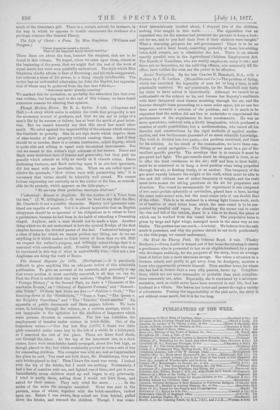Though Broken, Brave, By E. A. Ryder. 3 vols. (Chapman
and Hall.)—A story which seeks to exhibit the truth that prosperity is not the necessary reward of goodness, and that we are not to judge of a man's life by its success or failure, has at least the merit of good inten- tion. But we cannot honestly say that this novel has much other merit. We rebel against the improbability of the scheme which reduces the Garforde to poverty. Men do not sign deeds which deprive them of nine-tenths of their property without reading them. And if they should be so unwise, there is a certain institution, called Equity, which is quite able and willing to upset such fraudulent instruments. Nor can we assent to the writer's high estimate of her heroes. Dacro and Mark were doubtless men of honour and generosity, but they paid the penalty which attends on folly as surely as it attends crime. Deere disdaining business, and Mark entering upon it in absolute ignorance, did but meet with an inevitable fate. When we are called upon to admire the spectacle, "How virtue wars with persecuting fate," it is necessary that virtue should be tolerably well armed. We cannot forbear exproesing our curiosity as to the author of the line, so remark- able for its prosody, which appears on the title-page,—
" Et servata fides porfectus amorque ditabunt."


































 Previous page
Previous page